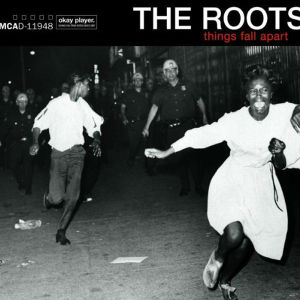Things Fall Apart (1999)
Classic Status
By Lewis Scaife
Hip hop beats are the raspberries of contemporary music. Favorite albums tend to molder on the shelves if they are not actively consumed. If the artist gets washed up, the product quickly disintegrates into mushy globules of something that was once delicious. What was fresh and expensive yesterday quickly turns to compost.
This is easily evidenced in once—maybe still—legendary gangster rap. If you actively follow hip hop or electronica, reviewing the majority of Tupac or Biggie Smalls beats will fill your ears with corn. “Changes” or “California Love” notwithstanding, a good many of these instrumentals would get laughed out of the studio today.
All it takes is about ten years, and sometimes less. Things move on and styles change. Things fall apart, or so they say.
The Roots’ Things Fall Apart has remained almost completely intact after ten years of on-off service with only a few rust spots forming in cultural crevasses. The 1999 release surpasses any of the groups’ subsequent work as a whole. Like any album, it has its peaks and valleys, but no song is a skipper.
Dark in mood and themes throughout, Things Fall Apart is headphone music, intended for personal listening and subsequent discussion. “You Got Me” with Eryka Badu is the most chilling (and well known) song on the album. On paper, “You Got Me” appears to be a simple song about a relationship under the long distance stress caused by frequent band tours. Predictable so far, but the beat—the haunting, black and grey keys and the bassline floundering like some injured but determined pigeon—it fills the song with a leaden beauty, a morbid catchiness that makes ten years seem petty.
Even the comparatively upbeat “Act Too (Love of my Life)” has a reserved shiver to it—no joyous outburst here as emcees Black Thought and the featured Common reflect on the music’s meaning to their lives personally, and to the broader culture. (An uncharacteristically good verse from Common, too—a little personification goes a long way).
The album swings into a slightly more aggressive direction with “100%
A note must be made about Malik B. Subsequent releases by The Roots have a decided lack of Malik B due to some personal issues. He appeared again on a couple tracks in the excellent Rising Down, but never again like he did in Things Fall Apart. This cost The Roots dearly. Black Thought might be the better or more flexible emcee overall, but Malik B was the anchor that most of these songs needed. While Things Fall Apart is an excellent hip hop album, it fails in the same way 99% of hip hop fails: most of the songs are about rapping, or about hip hop, or about the emcees being better emcees than other emcees. On such songs, only one thing holds my attention: diversity in voice, lyrical style and presence. Without Malik B there to switch things up, The Roots either have to rely on featured guests (hit or miss) or Black Thought to fill the void.
A review of Things Fall Apart would be incomplete without brief mention of “Double Trouble,” featuring Mos Def. The most playful song on the album, “Double Trouble” jumps back and forth between Mos Def and Black Thought as they share bombastic self-appraisals. The song bubbles and pops, beat to chorus. At the song’s conclusion, Mos Def takes us back briefly to the dawn of hip hop’s creation with a classic homage to the Kool Krush brothers.
Between clever braggadocio and elegant-yet-grim instrumentals, The Roots truly created themselves with Things Fall Apart. This is The Roots in their best form, as a complete crew, and in full effect. In days when less and less rap has significant staying power, Things Fall Apart has not yet reached its expiration date.



No comments:
Post a Comment